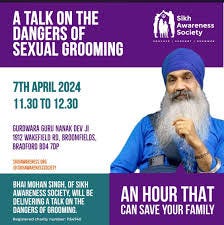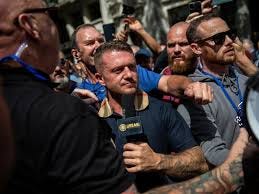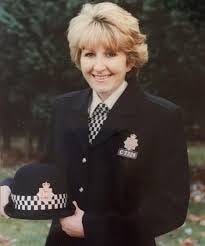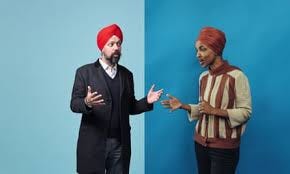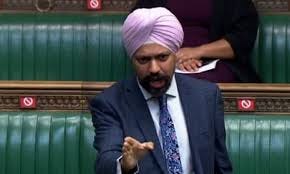Voting against a National "Grooming Gangs" Inquiry
Dhesi is 'passionate' about his politics when it comes to his voting base
The so-called ‘Grooming Gangs’ of the UK have gone in the past 20 plus years from being a topic ignored as an internal ‘Asian’ squabble during the 1980s and 90s to being cast as a ‘far right conspiracy’ before becoming a mainstream scandal and now an international political football.
Prior to the ‘Cool Britannia’ era of the New Labour hey days, murmurings about Pakistani Muslim men targeting Sikh and Hindu girls was largely seen to be a case of imported prejudices and an inability to integrate into the UK where boys and girls should be free to date and marry as they please.
Sikh groups eventually becoming frustrated with the condescending attitudes they encountered from the authorities and began to self organise forming The Sikh Awareness Society, a UK registered charity that aims to support victims of severe abuse including sexual abuse, grooming, domestic violence, alcohol and drug abuse.
Long before Tommy Robinson became a household name in the UK, Nick Griffin of the far right British National Party (BNP) had first voiced concerns on this topic in a televised interview in which he referenced Muslims in Derby preying upon young Sikh and White girls motivated by “a mix of sex and religion”. Griffin’s comments were rapidly dismissed as a ‘far right conspiracy’, largely due to the unpleasantness of Griffin and the history of thuggish behaviour from the BNP.
This would repeat itself a decade later with Tommy Robinson and the English Defence League (EDL) who also raised concerns over the grooming gangs based on their experiences in the town of Luton and surrounding areas. Robinson’s allegations were also dismissed as a far right conspiracy.
Former Detective Constable Maggie Oliver, a decade later, became a whistleblower and exposed the poor handling of the Rochdale child sex abuse ring case by her own force and eventually went on to expose the ‘grooming gang’ scandal.
More recently, this topic has garnered international interest after Elon Musk began to tweet about it on his platform X (formerly Twitter).
Tan Dhesi, a Labour Member of Parliament for Slough since 2017, heralded as the ‘first turbaned Sikh Member of Parliament’ and in the Guardian as the “first member of parliament to wear a turban and, like Omar (Ilhan), (with) a reputation for speaking out against anti-Muslim sentiment in government’
Dhesi came into the public limelight for his ‘passionate’ intervention at prime minister’s questions where he listed funerals and other events he had missed because of Covid guidelines, demanding then PM Boris Johnson apologise for not having sacked his then chief adviser Dominic Cummings.
Dhesi has previously locked heads with Johnson in an ‘angry and passionate’ question about the then PM’s language about minorities, and particularly his column in which he said Muslim women who wear the burqa look like letterboxes. Dhesi had demanded an apology from Johnson and accused him of racism.
Slough, a town in Berkshire, England was the setting for the 2001 British mockumentary sticom The Office. Slough has one of the most ethnically diverse populations in the UK with almost 47% described as “Asian” in the 2021 census.
The same census showed 32% of Slough's population identified as Christian, 29.4% as Muslim, 13% as having no religion, 11.4% as Sikh and 7.8% as Hindu.
Dhesi voted against a National Inquiry into the grooming gangs. Evidently his ‘anger’ and ‘passion’ is reserved for his fiery sermons in Parliament but seems to have cooled and withered away when it came to this topic which has gripped his own Sikh community and broader British Public for decades.
As the American Economist Thomas Sowell put it
“No one will really understand politics until they understand that politicians are not trying to solve our problems. They are trying to solve their own problems—of which getting elected and re-elected are number one and number two. Whatever is number three is far behind.”





